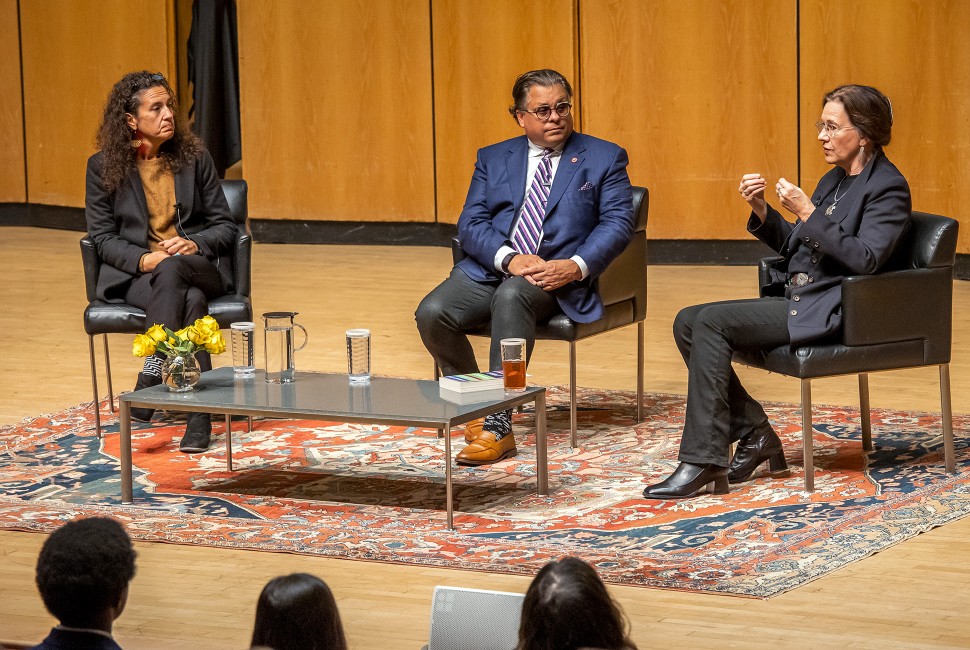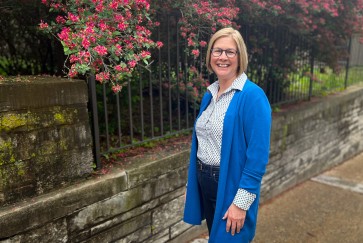Louise Erdrich, this year’s One Book One Northwestern author, spoke Tuesday evening on the Evanston campus about the Native people who inspired, “The Night Watchman.”
“I don’t write about politics and the moment. I write about people,” said Erdrich, who is a member of the Turtle Mountain Band of Chippewa and is of German descent.
Her focus on people, in this case her own Native people and family members, yielded both a Pulitzer Prize for “The Night Watchman,” as well as an exceedingly timely selection, as this year marks the 100th anniversary of the U.S. Indian Citizenship Act of 1924. That law was a euphemistically named effort by the federal government to terminate tribal treaty agreements, which ultimately failed because Native people like her grandfather resisted.
Published in 2020 during the COVID-19 pandemic, the book tells the story of Thomas Wazhashk, a night watchman, who spends long shifts keeping up with his work as leader of the tribal council and comes to realize the hidden objective of the “termination bill,” which would overturn long-standing Native American tribal rights if passed.
“The thought that you’d read this book today as a university and find something in it would make my grandfather so happy,” Erdrich said.
A tribal council leader comes to realize the “termination bill” would overturn long-standing Native American tribal rights if passed.
Moderating the keynote conversation were Dean of the School of Education and Social Policy Bryan McKinley Jones Brayboy (Lumbee) with SESP professor and director of the Center for Native American and Indigenous Research Megan Bang (Ojibwe and Italian descent), One Book faculty co-chairs.
Erdrich spoke about her grandfather being the last family member to speak Ojibwe until her grandson learned the language. It was her grandfather’s letters, collected and passed down to her by her mother, that were her point of entry into the book.
“The Night Watchman” takes place during a low point of the second wave of systematic oppression against Native Americans, which included the dual policies of boarding school relocation and the termination of treaties. The first wave was the government’s seizure of Native land and the forced removal of its occupants to reservations.
Reading her grandfather’s letters taught Erdrich to appreciate not only his graceful handwriting, but the charm and intelligence that was apparent in his correspondence – the same traits that he used to persuade his people to fight back against the government’s plans to terminate its treaty with the tribe.
Pursuing a plan devised by Utah Sen. Arthur Watkins, the government worked to convince tribes that giving up their land would win them more freedom and independence. Erdrich’s grandfather, despite only having an eighth-grade education, understood what the real intentions were. Just like Thomas Wazhashk, her grandfather got the Turtle Mountain community members to sign petitions and set up boxing matches to make money to send representatives to Washington.
“The elders were thinking way ahead in their treaties, they had put education and healthcare into them — they were abjectly poor, but at least they had their land and these basics,” Erdrich said. “What was left of the land depended deeply on these treaties. I knew what it meant to him and to the people living then, and I wanted to write about that.”
Erdrich was asked how she went about weaving together stories that illustrate timely issues in such a seamless way.
“You have to read and read and research and think in terms of your family. I’ve had to think deeply about my own family,” Erdrich said. “Maybe what you are thinking as you put together all the components into the dirt will give you an idea that will allow something to grow.”



